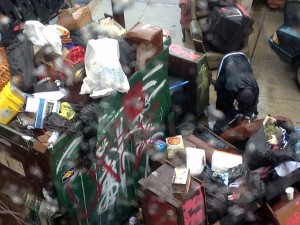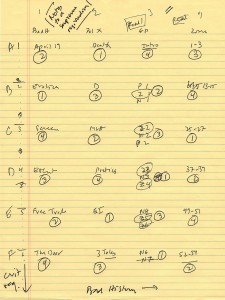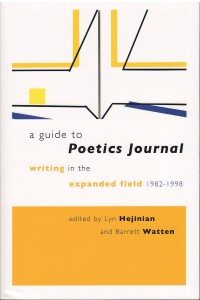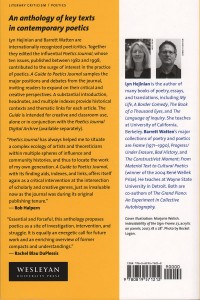The day Detroit threatened to declare bankruptcy–with a population loss of over 50%, and with 18 to 20 billion debt declared by new accounting–this was the scene in the alley behind my studio in the Canfield Lofts, in the pleasant and prosperous midtown area. A friend commented, “Basquiat!”; I thought “Rauschenberg”; Smithson would declare it a “nonsite”–there is a certain aesthetic appeal to the image, certainly, partly due to the water drops on the window, from a recent heavy rain and high temperatures, creating painterly effects. Pink graffiti meets material overflow as sensory excess. As art, the image presents itself to the senses so we would all agree that the pleasure we would feel is certainly not due to its depicted content.
>> Documents <<
June 6, 2013
Entry 17: Reading @ Nuremberg
Reading @ Nuremberg
Bavarian-American Academy
Stadtbibliothek Nürnberg
7:30 PM, 27 May 2013
For my reading, I took as a model my 1999 presentation at Kelly Writers House, about which Brian Ang wrote perceptively [here]. In that event, I used stanzas from “Non-Events” as my guide, alternating between a regular progress through the poem as semantic and rhythmic baseline, while adding selections from Bad History and prose from The Constructivist Moment. … More
May 15, 2013
Document 25: A Guide to Poetics Journal
An advance copy of A Guide to Poetics Journal: Writing in the Expanded Field, 1982-98 has just arrived. Orders may be placed now but will be fulfilled later (check here for updates on delivery). The entire project will not be “launched” until Fall 2013, when the companion Poetics Journal Digital Archive–which reprints nearly all of the 124 articles, 1600 published pages of the original journal in searchable, digital form–will be available. UPNE’s site for the anthology is here; a table of contents for the Guide may be found here. Click on either cover for a larger version.
May 14, 2013
Document 24: Ecstasy of Bookstores
A listing of titles acquired in my recent tour of Bay Area book sellers.
Literary and Cultural Theory
Brill, Dorothée. Shock and the Senseless in Dada and Fluxus. Hanover, N.H.: Dartmouth University Press, 2010.
Löwy, Michael. Morning Star: Surrealism, Marxism, Anarchism, Situationism, Utopia. Austin: University of Texas Press, 2009.
Maza, Sarah. Violette Nozière: A Story of Murder in 1930s Paris. Berkeley: University of California Press, 2011.
Rensmann, Lars, and Samir Gandesha, eds. Arendt & Adorno: Philosophical and Political Investigations. Stanford, Calif.: Stanford University Press, 2012.
Poetry
Alexander, Will. Compression & Purity. San Francisco: City Lights, 2011.
Brathwaite, Kamau. Trench Town Rock. Providence, R.I.: Lost Roads, 1994.
Brown, Brandon. Flowering Mall. New York: Roof Books, 2012. Signed by the author.
Cooper, Wayne. ed. The Passion of Claude McKay: Selected Prose and Poetry, 1912-1948. New York: Schocken, 1973.
I Met (Berkeley/Oakland/SF)
9-13 May 2013
(After On Kawara)
Amy Smith
Suzanne Stein
Jan Watten
Emilie Watten
Jamie Brunson
Karen Yandow
Randy Hussong
Suzy Barnard
Betty Jo Costanza
Clint Imboden
Brian Ang
Sara Larsen
… More
April 24, 2013
Document 23: Constructivist Poland
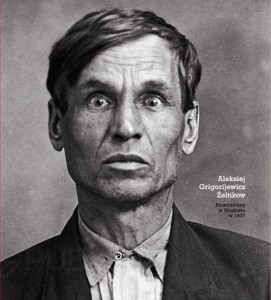 An annotated bibliography from travels to Lodz and Warsaw, April 2013, with apologies for the lack of Polish characters and diacritics.
An annotated bibliography from travels to Lodz and Warsaw, April 2013, with apologies for the lack of Polish characters and diacritics.
Modern History
Czerwinska-Rydel, Anna. W poszukiwaniu swiatla: Opowiesc a Marii Sklodowskiej-Curie. Warsaw: Akademia rozwuju wyubrazni BUKA. CD. Radio play on the life of Marie Curie, read by Anna Dymna.
Frankowski, Artur. Typespotting: Warszawa. Warsaw: Bec Zmiana, 2010. A guide to Warsaw through street signage and ad typography.
Kisny, Tomasz. Wielki Terror, 1937-1938 [The Great Terror, 1937-1938]. Warsaw: Narodowe centrum kultury, 2013. Photodocumentary of victims of Stalinist purges and terror trials, with contemporary images of remembrance. [See image.]
Kusinski, Jacek, Ryszard Bonislawski, and Maciej Janik. Ksiega fabryk Lodz. Lodz: Wydawnictwo Jacek Kusinski, 2009. Catalogue of industrial buildings in Lodz, then and now.
April 6, 2013
Document 22: OOO and Finance Capital
N. Katherine Hayles, “Speculative Realism and Speculative Finance: Exploring the Connections.” The 2013 Dennis Turner Memorial Lecture, Department of English, Wayne State University, 5 April 2013.
[KH abstract: Graham Harman’s object-oriented ontology (OOO) bears some startling similarities to contemporary finance capital, including the construction of objects whose content is obscure, increasing levels of abstraction, and the absorption of relations into objects. What can account for these convergences between two fields that are emphatically not engaged in conversation with each other? In exploring the question, this talk will discuss the economic conditions that currently shape academic employment as well as the financial markets.]
[BW disclaimer: the following are notes taken on my iPad during the lecture. No claims are made to adequately represent the structure and continuity of Hayles’s nuanced argument. Rather, these are “points sublimes” formulated in thinking along with her lecture. New arguments may be built out of them. Remarks in brackets are sidebars for responses or threads to pursue later.]
The Trading Pit and the Ivory Tower
[BW: boom and bust capitalism and devel of new media poetics]
global ecology and global finance as two great anxieties
mediation between/as spec realism [question of mediation; what is it?]
“secret alliances with speculative finance” with OOO [object-oriented ontology] as transducer
= “changing the construction of signals/values”
February 9, 2013
Document 21: The Grand Piano Reviewed
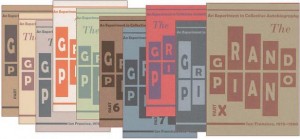
Luke Harley, “Poetry as Virtual Community: A Review of The Grand Piano: An Experiment in Collective Autobiography,” Jacket2, 7 February 2013. Click here.
In part due to its demanding format—ten volumes by ten authors, published over a five-year period (2006–10), totaling over 1600 pages—and in part due to the difficult questions of poetics and community it raises, The Grand Piano has only now, more than two years after the last volume saw the light, received the kind of engaged and comprehensive review that will help open its project to readers in all its multiple dimensions. Barry Schwabsky’s 2011 review in The Nation, uploaded to this site, was likewise welcome as an enthusiastic introduction to a broader readership, one that perhaps had not heard of Language writing and would like to know more. Harley’s review, on the other hand, assumes not only familiarity but positional engagement with the movement, these authors, this writing. Working through the debates of the 70s and 80s, as we did in The Grand Piano, Harley’s discussion extends literary history into the concerns of the present; it becomes, as Foucault would have said, a work of effective history. In so doing, his review joins Eleana Kim’s 2001 online history of Language writing to offer a broad overview of the movement, contributing to the work of documenting the past history and present possibility of language-centered poetics. Going beyond mere narrative history, critical readings like Harley’s reinterpret the effort to document the movement as a reenactment of its polemical force—from the archival matter of readings, talks, magazines, and books to its real-time engagement. Given the depth of discussion Harley and predecessors have initiated, one can only hope they will encourage more. La lutte continue!
... More
January 20, 2013
Document 20: Modernism and Value
Modernism and the Abstraction of Value:
Poetry and Political Economy in transition (1927-38)
During this recent era, linguistic understandings of political economy found purchase for a wealth of reasons, many of which have a grounding in actual conditions. Nonetheless [. . .] the literarity of such conceptions ended up participating in, and sometimes generating, serious analytic errors . . . . The misrecognitions of value engendered by modes of literarity thus pose a radical limit to the history of the present. —Joshua Clover, “Value/Theory/Crisis” (107, 109)
[Introduction]
In my lecture at the Poetry of the 70s conference at University of Maine (under the rubric “Late Capitalism and Language Writing”; 2008), I made a strong claim that the “turn to language” in poetry must be seen as simultaneously a response to the emergent horizon of neoliberalism after 1973 along with an anticipatory illumination, undertaken at the level of form, of what the new order of intensified commodification and mobility of capital would look like—and how it might be comprehended and opposed. … More
January 7, 2013
Document 19: Books @MLA/Gloucester
[for Sarah Ruddy]
In lieu of a list of resolutions for the New Year, a bibliography of books acquired at the recent MLA in Boston and on a side trip to Gloucester may point toward some of its promises.
Modernism
Isherwood, Christopher. Goodbye to Berlin. New York: New Directions, 2012. New ed. in single volume.
Walser, Robert. The Assistant. Trans. Susan Bernofsky. New York: New Directions, 2007.
———. Microscripts. Trans. Susan Bernofsky. New York: New Directions/Christine Burgin, 2012.
Post-1945
Beckett, Samuel. Waiting for Godot/En attendant Godot: A Bilingual Edition. 1952/1953. New York: Grove Press, n.d.
Perec, Georges. La Boutique obscure: 124 Dreams. Trans. Daniel Levin Becker. Brooklyn: Melville House, 2012. Advance copy.
Modernity
Chang, Iris. The Rape of Nanking: The Forgotton Holocaust of World War II. 1997; New York: Basic Books, 2012.
